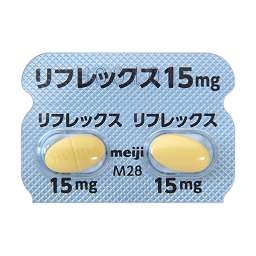1
/
of
1
Organon
Mirtazapine (Liflux) 15mg is effective in fighting depression and improving sleep and mood
Mirtazapine (Liflux) 15mg is effective in fighting depression and improving sleep and mood
Regular price
¥21,800 JPY
Regular price
Sale price
¥21,800 JPY
Unit price
/
per
Taxes included.
Couldn't load pickup availability
Antidepressants, increase 5-HT, improve sleep quality
Basic Information
- Chemical name : 1,2,3,4,10,14b-hexahydro-2-methylpyrazinyl[2,1-a]pyrido[2,3-c]azepine.
- Dosage form : Common ones are tablets, dispersible tablets, etc.
- Medical insurance type : Class A
Pharmacological Action
- Mechanism of action : Mirtazapine is a noradrenergic and specific 5-hydroxytryptamine antidepressant (NaS-Sa). It mainly blocks the central presynaptic α2-adrenergic receptors, enhances the release of norepinephrine (NE) and 5-hydroxytryptamine (5-HT), and then enhances the conduction of NE and 5-HT nerves, exerting an antidepressant effect. At the same time, it has an antagonistic effect on 5-HT2 and 5-HT3 receptors, which helps to reduce some adverse reactions related to 5-HT, such as anxiety, gastrointestinal discomfort, etc.
- Effects on neurotransmitters : It can increase the levels of NE and 5-HT in the brain, regulate the balance of these two neurotransmitters in the brain, and improve emotional state. The activation of the NE energy system helps to increase the patient's energy and interest, while the regulation of the 5-HT energy system plays a role in improving mood, sleep, appetite, etc.
Clinical Application
- Depression : Mirtazapine is one of the first-line drugs for the treatment of depression. It can effectively relieve depressive symptoms, including low mood, loss of interest, self-blame, sleep disorders, changes in appetite, etc. Mirtazapine may have a better therapeutic effect for patients with depression accompanied by anxiety, agitation or sleep problems.
- Anxiety disorder : It also has a certain therapeutic effect on some patients with anxiety disorders, and can reduce anxiety, nervousness, fear and other symptoms. Especially for those anxiety patients who also have depression symptoms, mirtazapine can treat depression and anxiety at the same time.
- Other uses : In some cases, mirtazapine can also be used to treat insomnia, especially for those caused by depression or anxiety. It can improve sleep quality, prolong sleep time, and reduce the number of nighttime awakenings. In addition, for some patients with anorexia, mirtazapine may increase appetite and help improve nutritional status.
Adverse Reactions
- Common reactions : The most common adverse reaction is weight gain, which may be related to the effect of mirtazapine in increasing appetite. In addition, drowsiness, dizziness, dry mouth, constipation and other symptoms may also occur. Drowsiness is generally more obvious in the early stage of medication and may gradually decrease as the medication time increases.
- Other reactions : Some patients may experience sexual dysfunction, such as loss of libido and erectile dysfunction, but the incidence is relatively low. In rare cases, severe adverse blood system reactions such as agranulocytosis may occur, manifested as fever, sore throat, oral ulcers, etc., which require close attention.
Precautions
- Drug interactions : Mirtazapine may interact with other drugs when used in combination. For example, combined use with monoamine oxidase inhibitors (MAOIs) may lead to severe "5-hydroxytryptamine syndrome", manifested as high fever, muscle rigidity, impaired consciousness, etc., so the combination of the two is prohibited. Combined use with central nervous system depressants such as alcohol and sedatives and hypnotics will enhance central inhibition and increase the risk of adverse reactions such as drowsiness and dizziness.
-
Use in Special Populations
- Pregnant and lactating women : The safety of mirtazapine for pregnant women has not been determined. It can only be used under the guidance of a doctor when the potential benefits outweigh the potential risks to the fetus. Breastfeeding women should use it with caution because mirtazapine can be secreted through breast milk and may have adverse effects on the baby.
- Elderly : Elderly people may have increased sensitivity to drugs and decreased liver and kidney function. When using mirtazapine, the dosage may need to be adjusted appropriately and adverse reactions should be closely monitored.
- Patients with impaired liver and kidney function : When patients with impaired liver function use mirtazapine, the metabolism of the drug may be affected and the dose needs to be adjusted carefully. Patients with impaired kidney function generally do not need to adjust the dose, but patients with severe impaired kidney function should use it under the guidance of a doctor.
- Discontinuation reaction : If you suddenly stop taking mirtazapine after long-term use, you may experience withdrawal reactions, such as dizziness, nausea, anxiety, insomnia, etc. Therefore, you should gradually reduce the dosage when you stop taking the drug, and avoid stopping it suddenly.
Share

